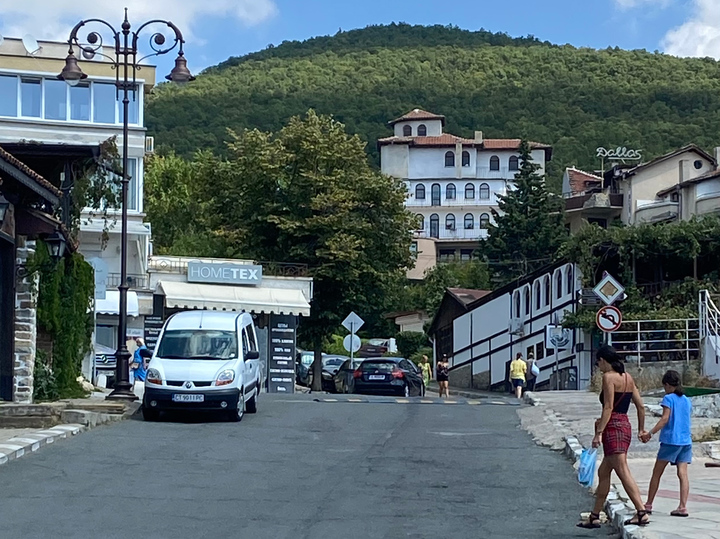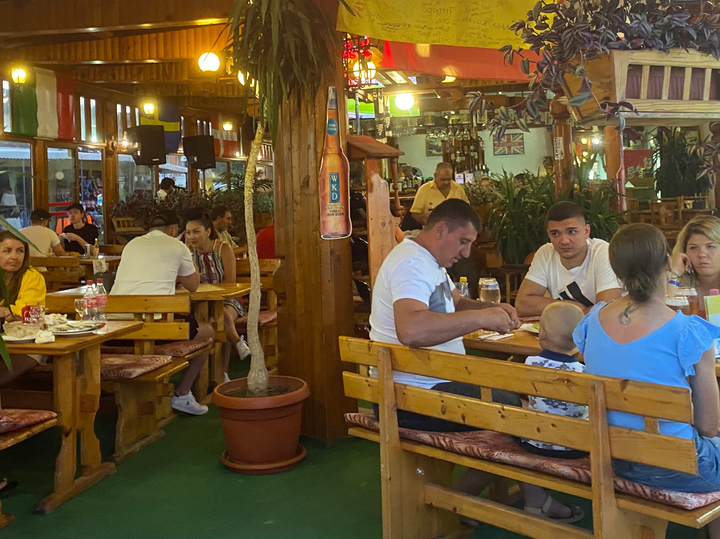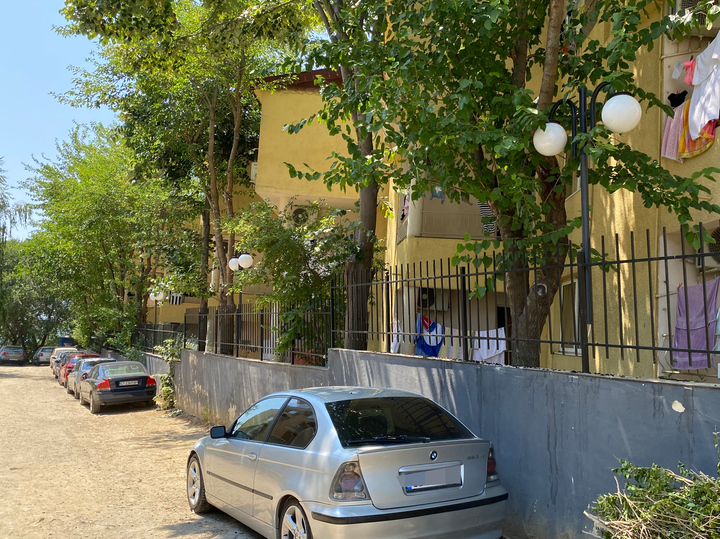How much does life cost in a Bulgarian resort: “We go to the toilet in a cafe”
[ad_1]
– Multiply everything by two, or even three, – a friend warned me before the trip, who moved to Bulgaria several years ago. – Forget about restaurants, shopping, excursions. Instead of taxis now, welcome to public transport.
I confess that I was skeptical about her advice until I ended up on Bulgarian soil.
When I got to our residential complex, I saw an ad on the door: “The cost of water per cubic meter has increased to 5 leva (270 rubles).”
“Electricity has also risen in price,” a neighbor stopped nearby. – You won’t pay on time, after a week without warning everything is cut down. For the connection, you will have to pay 13 leva (380 rubles) in addition to the bill. This is not Russia for you, baby, where housing and communal services debts have been accumulating for years. Payments here are not sickly: in a month I poured water for 60 leva (3300 rubles), electricity came out 70 (3800 rubles). If I had used air conditioning, they would have thrown another 80 leva (4360 rubles) on top. So I advise you not to turn on the air conditioner, turn off the water heating boiler at night.
– But it’s hot outside, like without air conditioning?
– It’s better to sweat than to be without pants by the end of the summer. I know people who not only do not turn on the air conditioner, but also go to the toilet in a cafe so as not to waste water in the toilet once again. Some wash in the shower in the pool. Many Bulgarians winter in one heated room, the rest are closed. In the cold season, I warm myself with an electric sheet, all the savings.
– Maybe it’s easier to sell the apartment and put an end to these torments at once?
– Try it, sell it, you won’t end up with hemorrhoids. Then one comrade shook off his apartment, the proceeds of the euro somehow helped him to transfer to a Russian bank. On the spot they gave out the amount in rubles at the extortionate rate. If you find a buyer who is willing to pay cash, consider yourself lucky. Just how to take out the money, it is not clear. More than 10 thousand dollars is impossible. This year, residential complex management companies are taking advantage of the moment: through intermediaries, they buy apartments from Russians at low prices, give cash to sellers. Those parts transport grandmothers to Russia with the help of acquaintances. Then their apartments are put up for twice the price.
There is a real estate agency next to our complex. There is a wooden sign in front of the door. It is written in chalk: “Offer of the day: 1 bedroom, 48 square meters, 3 minutes from the sea. 44,500 euros (4.8 million rubles).”
– Apartment prices have risen. Odnushka sell for 40-50 euros, – shared a familiar Bulgarian. – Remember, after the pandemic, the studio was sold for 15,000 euros? It was necessary to take, now you will not find anything less than 35 thousand. Also pay attention, two years ago there were posters on all the houses: “Sale”. Now there are almost no such ads. Everything was bought by the Ukrainians.
Two women are sitting on a bench near the real estate office – a mother and a daughter.
– How will the money be transferred to us if there is no foreign account? – with longing in her voice, one of the ladies asked an employee of the company.
– No problem, do you want us to give you rubles? – A lively man encouraged the Russians, – Or, for a certain percentage, we will transfer the euro through one Russian bank, we have an agreement with them.
– Is there an option to sell to the Russians, we will agree on the price with them and about the transfer of money?
“No chance,” said the realtor. – Russians don’t buy.

But this is not true. I specifically went to the notary office in Burgas, where they draw up real estate transactions. My God, but here the crowds of Russians are not only selling, but also buying up apartments. In front of my eyes, the man bought as many as two studios by the sea – for himself and for his children.
“Without TV, the sea is not gentle and the sun is not bright”
The Internet is something without which I can not imagine a vacation.
TV is something without which Russian pensioners cannot live. The sea is not gentle, the sun does not shine so brightly without news from the homeland.
In local chats, people shared with newcomers how to connect to Russian channels via the Internet, the monthly fee of which was 50 leva (2,700 rubles). My elderly neighbors quickly mastered this science. The old people started the morning by watching the news channel. The evening ended the same way. Turned on the TV at full volume so that vacationers by the pool were aware of the latest news from Russia.
The beaches of the Bulgarian coast were not empty, although they are far from Anapa. Prices for sun loungers and umbrellas are 10 leva each (550 rubles). The Russians, like the Ukrainians, preferred to occupy a free zone under the scorching sun.
Water parks were not popular this year. The cost of visiting soared to 70 leva (3800 rubles).
Excursions are all the more few who were interested. A two-day trip to Romania cost 280 leva (15,260 rubles). On this amount, with reasonable savings, you can live a week.
Taxi has become unaffordable. For a 15-minute drive, drivers asked for 20 leva (1,100 rubles). For example, to get from Sunny Beach to Burgas (30 minutes) – 70-80 leva (3800-4360). At night, the cost of this route rises to 120 leva (6540 rubles), despite the fact that gasoline in Bulgaria is the cheapest in Europe, about 2.80 leva (152 rubles) per liter.
Public transport to Burgas – 8 leva (440 rubles). In the city – 2-3 leva (110-165 rubles).
Transfer from Sunny Beach to Istanbul Airport – starts from 200 euros (21,400 rubles).
But the cost of clothing remained at the same level. Prices in leva have not changed. I was very surprised to hear a dialogue between two Russian women in Zara.
– While we were away, Zara went bad. This is what it means to leave Russia, – a girl of about 25 walked between the shelves.
“Yes, there’s absolutely nothing to take,” the friend nodded. – And horse prices.
And now objectively: forgive me, domestic manufacturers of the mass market, but no matter how we strain, we are far from Zara. But about the prices, the buyers are right. Only expensive – if we translate the cost of clothing into rubles, nothing has changed by European standards.

Let’s move on to catering. The first trip to the restaurant quickly beat off the desire to eat out. Compared to last year, prices have risen by 30 percent. And taking into account the collapsed ruble, the price of food has doubled. Now prices in ordinary Bulgarian restaurants have approached expensive Moscow establishments.
Shopska salad (tomatoes, cucumbers, cheese) – 10-15 leva (550-810 rubles). Prices for more interesting salads start at 19 leva (1000 rubles).
Breakfast with scrambled eggs or porridge plus coffee will cost about 16 leva (870 rubles).
Fish and meat – 30-40 levs (1700-2200), mussels – 10-18 levs (550-820).
On average, a dinner with wine for two comes out at least 100 leva (5500).
Over the past year, many Ukrainian restaurants have opened in Bulgaria. Olivier salad and herring under a fur coat for 15 leva (800 rubles), borscht – 10 leva (550), and donuts for 3 lev (160) appeared on their menu. Dumplings, dumplings, pancakes for 13-15 leva (700-800). In these cafes you can enjoy lunch for only 15 leva (800), which includes soup, second course, lemonade.
If money is really tight, it is better to switch to street food. I found the cheapest hamburgers and hot dogs for 5 leva (270 rubles). I saw a piece of pizza already for 3.5 (190). Grilled chicken to go – 13 leva (708 rubles). There is always a queue near the stalls with low cuisine.
But the Russians bypass McDonald’s. The cost of a Big Mac for 10 leva (550 rubles) scares away.
“The minimum pension is greater than our maximum”
After weighing all the pros and cons, we decided to cook at home. But here, too, you can’t really make a fuss. Each trip to the supermarket cost about 150 leva (8,000 rubles). There was enough food for two days.
Judge for yourself: a package of dumplings – 14 levs (760), chicken fillet – 15 (817), pork – 19 (1035), doctor’s sausage – 18 (981), milk – 4 (218), hard Bulgarian cheese – 19-25 levs (1035-1400 rubles).
Basically, products are delivered to Bulgaria from Germany and Poland. Ukrainian goods also appeared in stores, mainly cookies, sweets, kvass. For example, a real “Kiev” cake can be bought for 32 leva (1800 rubles). True, I was confused by the production time – April 2023.

Shelves with Russian products thinned out. I found only tea and buckwheat. But there are enough Belarusian goods: marshmallows, Alenka chocolate, ice cream, cottage cheese, milk, sour cream, condensed milk, squash caviar, pickles.
The situation with fruits and vegetables is sad: cherries 500-800 rubles, watermelon – 3.50 levs (190 rubles) per kilogram, grapes and peaches – 7-8 levs (380-450). Pink tomatoes – 6.5 leva (350), cucumbers – 3.80 (207). Berries from 20 leva (1100 rubles).
– Everything has become very expensive. I can’t afford homemade feta cheese with my salary of 600 leva (32,700 rubles), – complained the distributor in the meat department of the supermarket. – Recently I arranged a holiday for myself, bought a chicken schnitzel in batter. Only 5 leva (270 rubles) for 2 pieces, take it too, you won’t regret it. And catch discounts in the German Lidl store. On sales days, you can buy meat there for 10 leva (550 rubles), while everywhere for 20 (1090).
The owner of a shop that sells “elite” yellow chicken for 26 leva (1,470 rubles) per kg and hand-made dumplings for 17 leva (926 rubles) was surprised that Russians began to rarely go to her: “My prices for chicken have not changed , not a hundred. If there is no money, take it like that, give it back later. Is everything so bad with you if you think that the products are expensive?
Only alcohol prices remained stable. If something has risen in price, it is not significant. A Russian living in Finland assessed the cost of alcohol in Bulgaria as follows: “What do you know about prices? In the matter of tobacco and alcohol, this is paradise. Beer is 7.5 times cheaper than in Finland. There, 0.5 local beer costs 3-3.5 euros, and here Kamenitsa 2 liters costs 1.6 euros.”
True, the man later recovered, describing in the chat his impressions of the initial purchase of products in the supermarket: “I will tell you, the prices were somewhat surprising. I buy most of the products in Finland cheaper, and I don’t go to the cheapest retail chain. Cheese, ham, sausages, sausages, milk, yoghurts in Finland, oddly enough, are now cheaper.”
If earlier Russians in Bulgaria discussed the weather, the sea or the variety of the restaurant menu (where the freshest mussels are), now most of the conversations come down to prices.
– In Bulgaria, the minimum pension is BGN 529 (29,000). This is more than our maximum. Widows are also paid a second pension for the loss of a breadwinner. The official cost of living in Bulgaria is 400 euros (42,800 rubles), we can only dream of such a thing. But you can’t live here on 28,000 or 40,000 rubles, – a lady of Balzac’s age grumbled on the beach.
– All right, we are indignant, but we still go to Bulgaria for any money, – her friend chuckled. – The Russians do not care about any problems. I remember when prices rose here, the British began to sell real estate. Can they overcome the difficulties we are accustomed to…
Read also: “Breakfast – 6,000 rubles”: Russians in Istanbul howled from rising prices
[ad_2]
Source link






